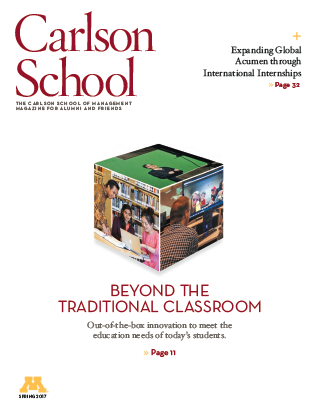
Global Medical Valuation Labs
Tuesday, August 1, 2017
Bryana Mayer, ’15 MBA, is a senior oncology specialist at Merck as well as an adjunct faculty member at the Carlson School. She participated in three Medical Industry Leadership Institute (MILI) Global Medical Valuation Labs, starting with an inaugural course in Sao Paolo, Brazil, led by MILI Director Stephen Parente. The program is designed to give students a better understanding of how to evaluate a new technology from a global perspective and increase their ability to work in cross-cultural teams.
She worked on a healthcare strategy project with Johnson & Johnson Brazil where she presented a marketing sizing analysis and strategic recommendations to the president. Her second course was a Global Valuation Laboratory course with a partner school in China, the University of Shanghai for Science and Technology. The third experience was with the Stockholm School of Entrepreneurship in Sweden.
“The MILI global courses provided the opportunity for me to work in cross-cultural teams, performing rapid market analysis to determine a product’s potential for success in global markets,” she says. And when Mayer says work, she means it. Her team researched intellectual property rights, sized up potential markets, completed written and verbal investment analyses, and made recommendations to clients and investors on whether to move ahead.
The MILI experience offered Mayer educational opportunities she could not have received either in a classroom in Minnesota or in a conference room at the multinational company she works for. “The opportunity to work beside and learn from Chinese inventors, investors, healthcare providers, medical industry executives, and students through the course greatly increased my value to current and future employers,” she says. In fact, she was able to demonstrate her learnings while interviewing for a new position at Merck last year. “I truly believe my international experience was a differentiating factor that led to my offer of the position,” she says.
MILI Director Parente says these kinds of student experiences, especially when they involve travel, get people out of their comfort zone. It is one thing when you are in a classroom, but when you are in a completely different location, such as China or Sweden, different parts of your brain are firing. “You still have to do a task, but you are immersed in a whole new set of challenges,” he says. “The students and the instructors share in the adrenalin of such an intensive experience and it makes for a better education.”
